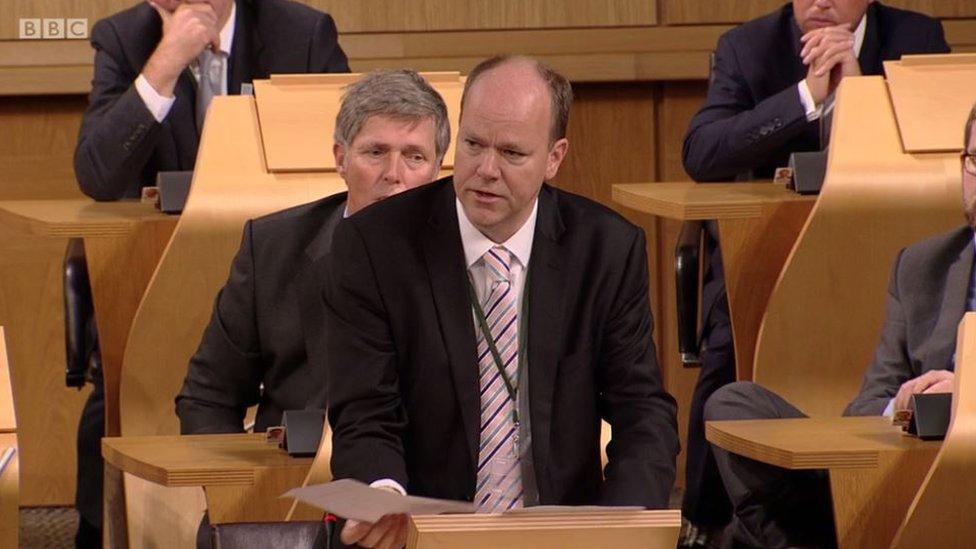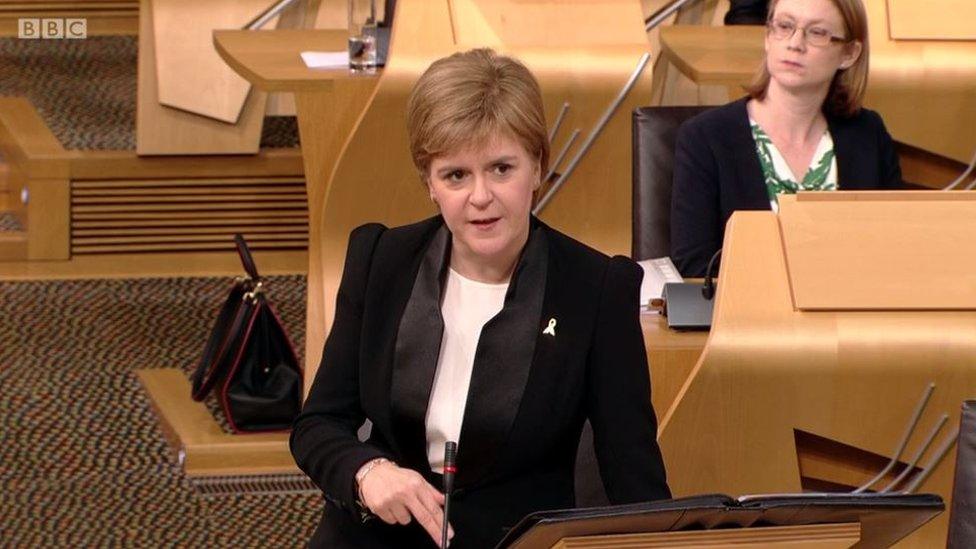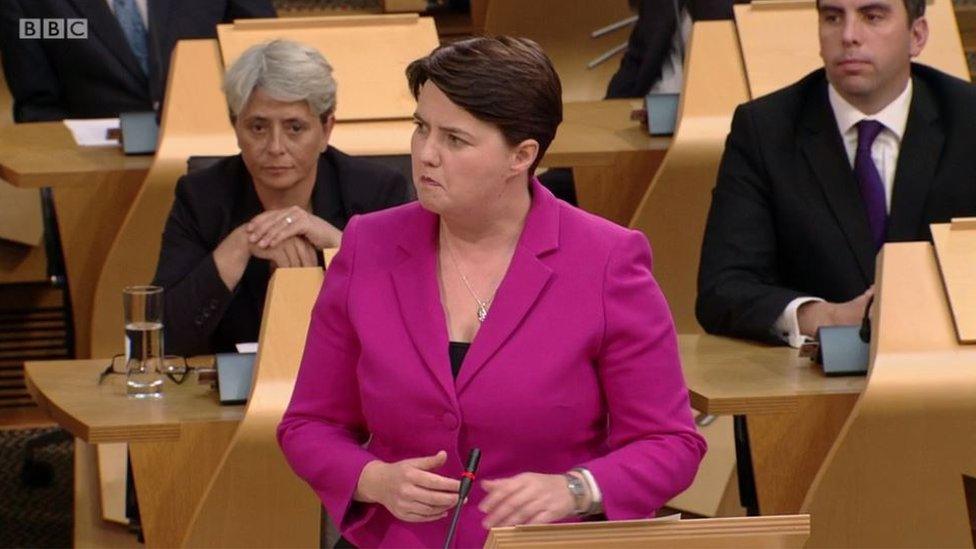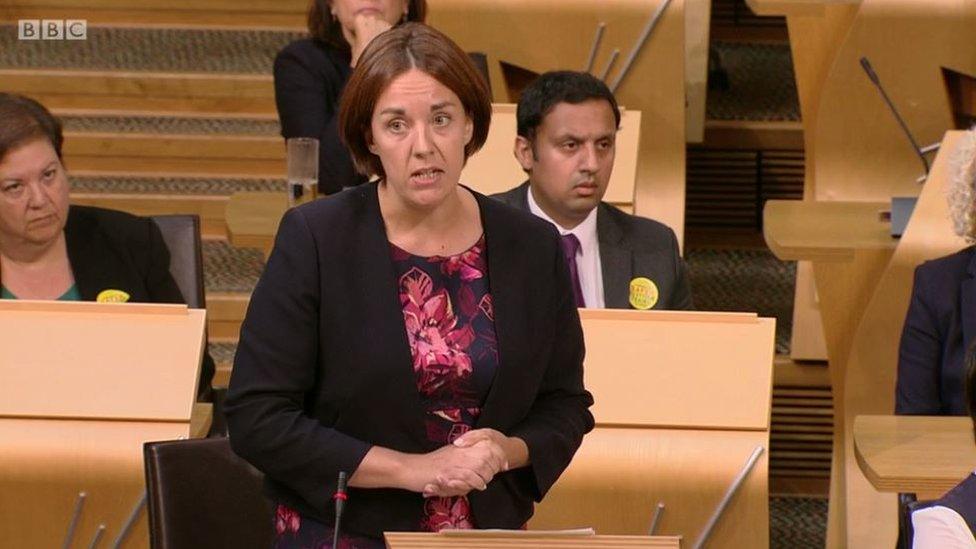FMQs: SNP and Tories contest a Holyrood blame game
- Published

Gordon Lindhurst has known his share of electoral disappointment - but has finally won a seat at Holyrood
There was, opined Tory MSP Gordon Lindhurst, a "dark cloud" hanging over Scotland. Now, this merits attention in that Mr Lindhurst's background would lead us to infer that he knows a bit about gloomy water vapour.
Firstly, he is an advocate. Not, I would suggest, an intrinsically cheerful profession. In Scotland's sombre courts, essaying a stand-up routine can be guaranteed to add six months to your client's sentence.
Secondly, Mr Lindhurst contested elections, both at Westminster and Holyrood, on numerous occasions before the Tory tide - and, undoubtedly, his own intrinsic merits - swept him into elected office in the Scottish Parliament this year, on the Lothian list.
He has, in short, known political pain and disappointment.
However, to be fair, he seemed to be bearing his burden with composure and aplomb. Indeed, he grinned broadly as he swapped insults with the first minister.
And that "dark cloud"? It was, said Mr L., the prospect of indyref2. Scotland's economy, he argued, was showing clear signs of uncertainty and disquiet. The very last thing required was another referendum on independence.
Further, he reminded Nicola Sturgeon of the outcome in 2014. No, he said, means no. Just as, presumably, Brexit means Brexit - although Mr Lindhurst, wisely, did not go down that road.

Nicola Sturgeon hit back that it was the Tories who had caused uncertainty
Ms Sturgeon, however, faced no such restraint. The only dark cloud she could discern on the horizon was the prospect of Britain, including Scotland, being obliged to leave the European Union.
This, she argued further, was driven by a "reckless gamble" by the Tories in calling the EU referendum earlier this year.
For the Tories to attempt to heap blame on others was, she said, like an arsonist blaming the fire brigade. At which point, she subsided, evidently content with her rhetorical rebuff.
Now only a pedant would point out that, in Scots Law, there is no such offence as arson. I am that pedant. It's wilful fire-raising north of Gretna (as Ms Sturgeon, a lawyer, undoubtedly knows).
Still, you get the concept. The underlying narrative in contemporary Scottish politics is a form of blame game between the SNP and the Tories.

Ruth Davidson
The SNP: 'You, the wicked Tories, have jeopardised Scotland's prosperity with your daft EU referendum.'
The Tories: 'Whatever, there is no need to make things worse with indyref2.'
The SNP: 'Of all the brass-necked…..!'
The Tories……
This narrative will drive political debate until, eventually, we begin to add a little substance to the mix as to what Brexit might mean, in practice.
Earlier in the exchanges, party leaders had raised an eclectic mix of topics. Ruth Davidson went first - as befits her new status - and pursued the issue of British Transport Police whose remit is to be devolved to Holyrood and incorporated within Police Scotland.
Cross-border cooperation
Ms Davidson read out emails from serving transport cops to the effect that cross-border cooperation would falter and the public would suffer as a consequence.
In essence, it was Part Two of previous complaints about Police Scotland more generally - although those were more frequently associated with the Liberal Democrats.
In sum, Ms Davidson argued that the Police Scotland merger had been less than successful - and that Ms Sturgeon should not make things worse with BTP.
The FM noted that the devolution of BTP had cross-party support within the Smith Commission and that every care would be taken to ensure that the new set-up worked efficiently. The pair parted by accusing each other of "shoddy politics".

Kezia Dugdale raised the issue of mental health care for young people
For Labour, Kezia Dugdale pursued a topic of the very highest sensitivity - that of mental health problems afflicting young people. She did so very effectively: with the right blend of compassion and exasperation.
Her party had drawn together stats indicating the delays affecting young people in getting support. She had a specific suggestion - that there should be counsellors attached to schools in an effort to pre-empt problems.
It was a serious topic, seriously addressed. In return, Ms Sturgeon also rose to the occasion. While stressing the degree of commitment in her government, backed up by new money, she readily conceded that provision was insufficient.
Tough questions
It was, in my view, an example of effective parliamentary scrutiny. Ms Sturgeon faced tough and detailed questioning, without bombast or vainglory. In return, she promised heightened endeavour. It is certain that she will now press for action on this promise within her government.
For the Greens, Patrick Harvie also pursued a serious issue, that of the possible use of Scottish Limited Partnerships for tax evasion purposes. Ms Sturgeon noted that control over this was reserved to Westminster while promising to do everything within devolved power to assist.
Under reforms instigated by the Presiding Officer, Ken Macintosh, there was then an additional opportunity for backbenchers to ask supplementary questions on a range of topics. In my view, the reform worked well - extending the scope of the scrutiny.
This wasn't Willie Rennie's week to ask questions. But members of his team got a chance - including Mike Rumbles who said that the system of farm payments had descended into a "shambles".
Fergus Ewing will update parliament on this troublesome issue next week. Meanwhile, only a pedant would point out that the strict meaning of the word "shambles" was, originally and perhaps aptly, a slaughterhouse. And, yes, I am that pedant.